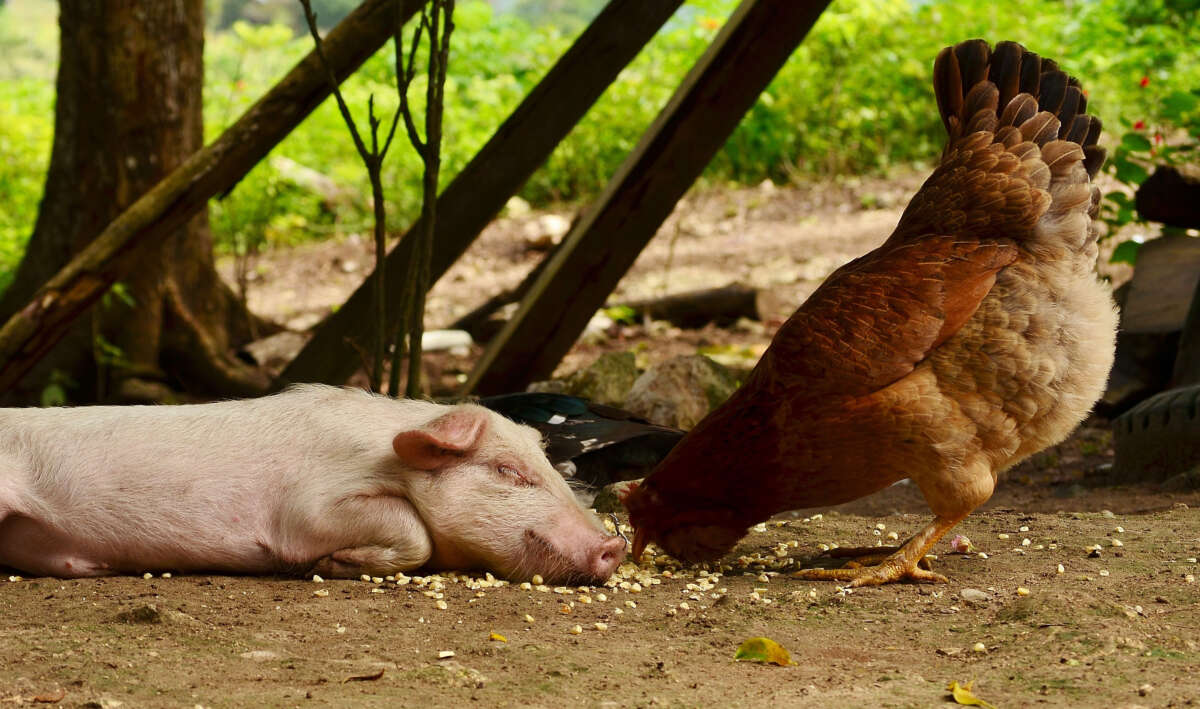Did you know that Truthout is a nonprofit and independently funded by readers like you? If you value what we do, please support our work with a donation.
A new study published in Frontiers in Veterinary Science argues that there should be a moratorium on building or expanding poultry and pig farms because of the high risk of zoonotic disease.
While the study focused specifically on the U.K., the findings concern pig and poultry farming globally.
“The disease risks to humans from industrialized intensive animal farming, and especially mixed swine and poultry farms, are enormous, and must not be understated,” the report says. “The authors therefore strongly discourage granting any planning applications for new or expanding industrialized intensive animal farms, especially poultry and pig farms or a mix thereof, and especially in areas with high existing concentrations of intensive animal farms.”
Zoonotic diseases, or infectious diseases that can spread from animals to humans, were the cause of the COVID-19 pandemic, which is estimated to have killed at least 3 million people in 2020 alone. At the time, there was evidence that minks being farmed for their fur in Denmark were contracting COVID and passing it to humans. In response to COVID outbreaks in more than 200 farms, Denmark culled 17 million minks.
“I worry we are not doing enough to monitor that situation to make sure this virus isn’t spilling into the animal populations,” Jonathan Runstadler, professor in the department of infectious disease and global health at the Tufts University Cummings School of Veterinary Medicine, told NBC News in 2020. “The other area to be concerned about is having this virus spill into an animal host that becomes a regional or local reservoir for viral infections,”
In addition to fur farms, factory farms have been responsible for multiple zoonotic disease outbreaks, including the 1997 Bird Flu (H5N1), 2009 Swine Flu (H1N1), and 2020 Bird Flu (H7N3). Recent reports assert that the next global pandemic may come from commercial factory farms, which are breeding grounds for zoonotic diseases due to overcrowding, limited genetic diversity, compromised hygiene and elevated stress levels in animals.
“There is exceptionally strong evidence for a link between low animal welfare levels and high disease transmission risks,” Andrew Knight, co-author of the report and professor in the School of Environment and Science at Griffith University, told FarmingUK. “These environments are fertile breeding grounds for the emergence of new influenza pandemics and other dangerous diseases.”
These factors collectively weaken the immune systems of the animals involved, which make them more susceptible to spreading diseases that can make the jump to humans.
“There are also established concerns about intensive farms being hot beds for disease,” Jenny Mace, an animal welfare lecturer at the University of Winchester and co-author of the report, told FarmingUK. “Despite these concerns, planning permissions are still being granted for new intensive farms or expansions of existing farms.”
While there has been a steady increase in legislative attempts to place a moratorium on factory farms, such as the Farm System Reform Act, introduced over multiple legislative sessions by Sen. Cory Booker (D-New Jersey), factory farms are increasing globally. In the U.S., 99 percent of animals farmed for meat are raised in factory farms.
The report’s authors argue that instead of building or expanding factory farms, “[e]fforts should concentrate on supporting arable agriculture (or transitions toward this), and on de-intensifying remaining animal farms.”
Press freedom is under attack
As Trump cracks down on political speech, independent media is increasingly necessary.
Truthout produces reporting you won’t see in the mainstream: journalism from the frontlines of global conflict, interviews with grassroots movement leaders, high-quality legal analysis and more.
Our work is possible thanks to reader support. Help Truthout catalyze change and social justice — make a tax-deductible monthly or one-time donation today.
